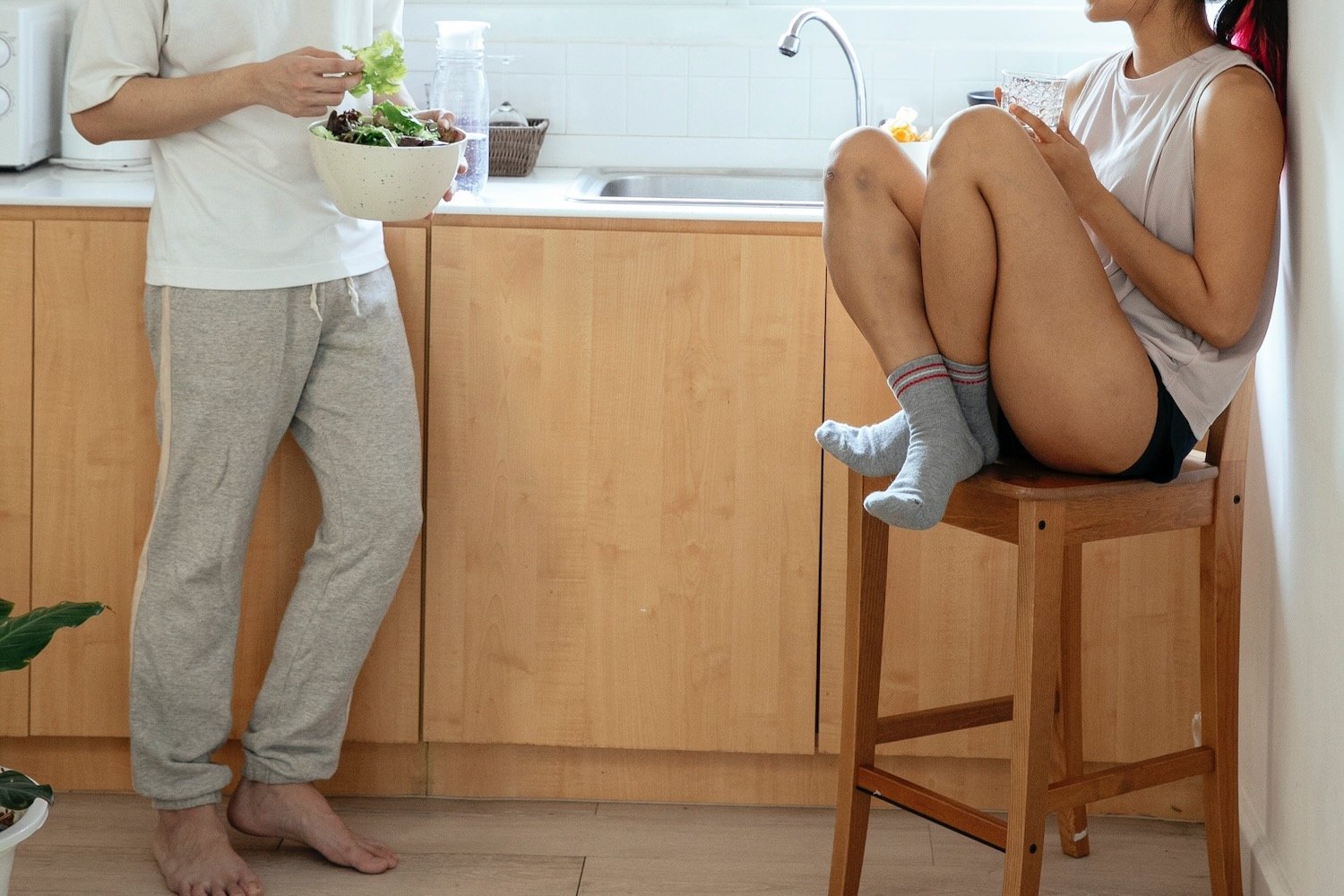4 Things To Try So Your Partner Of 1000 Years Doesn’t Feel Like Your Roommate
And 4 things to absolutely avoid at all costs.
by The Candidly Team
Forgive us while we state the obvious here. But marriage is weird. Partnering ourselves up with another person, in general, is weird.
Because it’s not just about sharing the fun stuff: romance, dates, sex, adventures, affection. You know, all that stuff that brought us together in the first place.
It’s also about uniting our practical lives: our heaps of responsibilities, the things that exhaust us daily.
Partners we selected based on laws of attraction and intimacy are now also our partners in property management, finance, child rearing, pet ownership, menial home maintenance, and every tedious form we ever have to fill out til death do us part.
And while having someone to bare burdens alongside us sounds like it should be a perk, it also takes a tremendous toll.
Any two people are going to have their own two ways of doing things (or of not doing things), which explains why the words “did you remember to” is the kick off to 57% of couple conversations.
And they have their own triggers, which is why “can you please stop …” is the kick off to the other 43%.
But the degree to which we’re able to peacefully navigate our practical lives without sacrificing our personal passions is one of the prime measures for whether or not we can make our relationships work. Not just make them work, but make them worthy.
If we really want to keep our partner of forever from feeling like our roommate, if we still want to soften and swoon and light up around them, rather than leaping into immediate mom/ maid /manager mode, then we have to do these 4 things.
Who decided on these four things, you might ask. Well, they come from research from The Gottman Institute, an organization that’s spent decades studying couple relationships.
We spoke to Licensed Mental Health Counselor and a Level 3 Gottman Method trained couples therapist Genesis Games, all about the research-based ways to curtail the roommate-trap. And here’s what we must do:
1) Can you tell us some of the specific habits or patterns that couples can look out for that might indicate they're heading into roommate territory. Please feel free to list as many as come to mind. We do love a list.
If you find yourself bickering with your partner “without arriving at a resolution” about any of the following things (cleanliness, organization, keeping tabs on chores, laundry, use of common areas of the home), according to Games, you might definitely be dipping a toe the realm of roommate-hood.
The key thing to notice is if your conversations have any of these four elements at play that are throwing them into cold or hostile territory.
These are:
Criticism: “You’re such a slob. I can’t believe how much stuff you just leave all over the house.”
Contempt: “I have to do everything myself. You don’t notice anything around you that needs to be done unless I point it out.”
Defensiveness: “What do you mean I never help with dishes? You leave dishes in the sink all the time. And I’ve done like 12 other things today you should be thanking me for.”
Stonewalling: “I’m not gonna talk about this with you. You’re too worked up.”
2) Partnering up with someone in life is inevitably gonna involve sharing some deeply practical tasks. But what are some of the problems that can arise in the relationship when you lose some of the romantic steam and start to feel like you're just divvying up household duties with a pal?
“We lose the romance, fun, and ease,” said Games. “Our interactions become just about household chores. We become resentful of the other person, either because we don’t consider they are pulling their weight or because they come off as demanding and micromanaging.”
According to Games, it’s not just how we handle the workload that we inevitably face together as a couple that matters, but what we sacrifice and forget to do with our partner because of that workload.
“When most of our interactions revolve around household chores, we stop talking about what truly matters, us. We stop sharing about our days, our hopes and fears, plans for the future, etc. This creates an emotional disconnect over time.” said Games. “Roommate problems are a distraction from emotional connection, because you don’t have deep conversations about values and the future with a roommate. We can’t expect to treat our partner like a roommate AND also feel emotionally connected AND desire.”
3) Is there actually an effective way to parse out all the practical responsibilities from the personal or romantic side of things? How do you flip the switch so to speak?
“I don’t think you can completely separate the two, I think they can bleed into each other, for better or for worse,” said Games. However, the good news about “roommate issues” is that most of them have resolutions. In fact, Gottman actually lists “housework” as one of four highly common but very “solvable” relationship problems.
Tips for how to make this aspect of our partnership more streamlined and less contemptuous are pretty straight-forward:
Divvy up tasks. Make lists of who will take care of what. “Be clear and direct about the chores and what they entail,” said Games. “Discuss your strengths and weaknesses. Who’s the cook? Who finds organizing relaxing?”
Focus on it feeling balanced, not split down the middle. “Be realistic,” advised Games. The division of household chores will rarely be a perfect 50/50. What matters is that it feels fair enough to both people and that both are able to be flexible.
Discuss expectations for cleanliness and organization. “Practice acceptance,” said Games. “We all have a method to our madness.” We may need to compromise in order for our standards to match up and be good enough for everyone.
Don’t keep score. Anytime a couple engages in a tit for tat, they’re inviting resentment and failing to see each other for who they are and what each of them brings to the relationship
Give up control. “A lot of times the back and forth with household chores is truly a power struggle,” said Games. “Things just need to get done. It doesn’t have to be your way … your way is not the superior way.”
Say “thank you.” It doesn’t matter how small the act is, noticing each other’s contributions and showing outward appreciation for them is a big deal. It helps each person feel seen, separate, and not taken for granted. Feeling invisible or alone in an effort is big part of what makes couples feel like roommates instead of feeling connected. A thank you can be oddly powerful and deeply romantic.
4) Can you tell us some very specific actions we can take to keep ourselves feeling excited and lit up by our partner and our relationship?
Ironically enough, couples who carve out very specific, and yes, sometimes scheduled, time to do these four things are the ones that continue to feel the most spontaneous passion and love for each other. Here’s how Games lays them out:
Weekly check-ins “where you both get to share appreciation for one another, discuss what went well, areas of improvement, and a goal for the following week. This one is all about the relationship.”
Daily check-in “about life and outside stressors like work, extended family, and current events. This one is about letting your partner into your world.”
Intentional quality time 2-3X per week. “This may include a date night, but it doesn’t have to. You can get creative with the intentional quality time. This just means that you carve time out to do an activity or have a conversation without interruptions. Maybe you go for a 3-minute walk with no phones. Maybe you pop a bottle of your favorite wine and watch reality TV after the kids go to bed.”
Prioritize fun, laughter, and sex! “Having fun, laughing, and having sex with my partner are more important than having an immaculate kitchen. AND For my partner to have fun, laugh, and have sex with me, they need to feel at ease, I can help that by taking things off their plate.”
When it comes to keeping our own feelings alive and well with a partner we share such a tremendous load of life with, it’s refreshing to think that the biggest lesson is that sometimes we just have to remind ourselves to to gently lift that load off the relationship. And it’s helpful to have a list of tools at the ready to ensure that when that lid is lifted, real connection happens.
Because we do love that roommate. And we do love a list.
This article is for informational purposes only. It is not intended to be used in place of professional advice, medical treatment, or professional care in any way. This article is not intended to be and should not be a substitute for professional care, advice or treatment. Please consult with your physician or healthcare provider before changing any health regimen. This article is not intended to diagnose, treat, or prevent disease of any kind. Read our Terms & Conditions and Privacy Policy.











